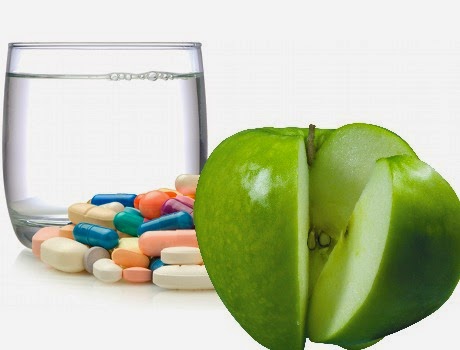Could an Apple a Day Help Keep the Pharmacist Away?
 Study finds no effect on doctor visits, but a slight decrease in need for prescription meds
Study finds no effect on doctor visits, but a slight decrease in need for prescription meds
(HealthDay News) — Munching each day on a McIntosh, Granny Smith or other apple might not keep the doctor at bay, but a new study finds apple eaters are less likely to need a prescription medicine.
The study, funded by the U.S. National Institutes of Health, looked at data from nearly 8,400 people who took part in federal health surveys between 2007 and 2010.
Of those participants, 753 (9 percent) were apple eaters — at least one small apple per day — and the rest were non-apple eaters.
Widget not in any sidebars
Apple eaters were slightly less likely to use prescription medications, reported a team led by Matthew Davis, of the University of Michigan School of Nursing in Ann Arbor.
But apple consumption was not linked to other health markers — things such as the number of annual doctor visits a person made, frequency of overnight hospital stays, or visits to a mental health professional.
And the study wasn’t designed to find that apple consumption caused any uptick in health. Davis and colleagues found that people who ate at least one apple each day also tended to have higher levels of education and were less likely to smoke.
Overall, the findings “suggest that the promotion of apple consumption may have limited benefit in reducing national health care spending,” the study authors concluded.
Experts agreed that eating apples might be at least a signal of a healthier lifestyle, however.
 “The data suggests an apple a day keeps the prescription pad at bay,” said pharmacologist Victoria Richards, an associate professor of medical sciences at the Quinnipiac University School of Medicine in Hamden, Conn.
“The data suggests an apple a day keeps the prescription pad at bay,” said pharmacologist Victoria Richards, an associate professor of medical sciences at the Quinnipiac University School of Medicine in Hamden, Conn.
Erin Keane, an outpatient dietitian at Lenox Hill Hospital in New York City, agreed.
“This study does leave open the possibility that apple lovers do have healthier lifestyles in general, which could explain the association between apple-eaters and fewer prescription medications,” she said.
Keane also pointed to the apple’s nutritional goodness.
“Apples are a good source of soluble fiber, vitamin C and certain flavonoids, as are many fruits and vegetables,” she said. “For these reasons, apples help decrease our [bad] LDL cholesterol, boost our immune system, and provide us with anti-cancer compounds,” she added.
“We should take advantage of this sweet treat and use it in place of dessert or as part of a snack with some nuts or low-fat cheese to get us on the right path towards health,” Keane believes.
The study was published online March 30 in the journal JAMA Internal Medicine.
More information
The U.S. Centers for Disease Control and Prevention has more about fruits and vegetables.
SOURCES: Victoria Richards, Ph.D., aassociate professor of medical sciences, Frank H. Netter MD School of Medicine, Quinnipiac University, Hamden, Conn; Erin Keane, R.D., outpatient dietitian and certified diabetes educator, Lenox Hill Hospital, New York City;JAMA Internal Medicine, news release, March 30, 2015
Last Updated: March 30, 2015
Copyright © 2015 HealthDay. All rights reserved.




